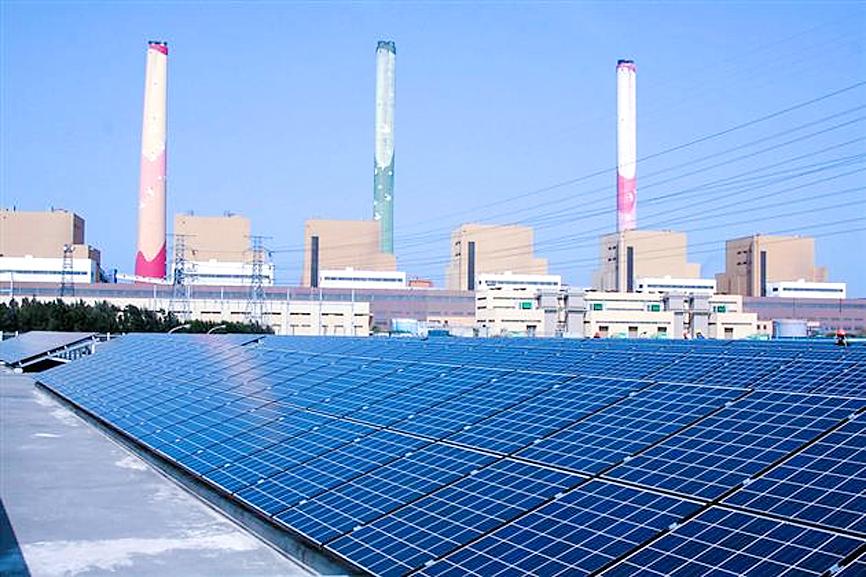Taiwan Power Co (Taipower, 台電) yesterday continued to urge the Taichung City Government to approve new liquefied natural gas (LNG) generators to further the utility’s emissions-cutting plan of phasing out its coal-fired generators.
Taipower’s remarks came as the city government demanded that Taipower decommission four coal-fired plants before constructing the LNG generators, a timetable that the utility has rejected.
Taipower’s plan to build an LNG terminal and two generators in Taichung has been rejected seven times by the city government, the Chinese-language Liberty Times (sister paper of the Taipei Times), reported yesterday, citing an unnamed Taipower executive.

Photo courtesy of Taiwan Power Co
Taipower manager Chang Ting-shu (張廷抒) confirmed that Taipower “remains in talks” with the city government to obtain approval to begin construction of the generators.
“It is unreasonable for Taichung to ask for the old generators to be decommissioned before the new generators are built,” Chang said.
Construction would take “at least three years” for the generators, and “longer” for the terminal, which would ensure a steady supply of LNG to the generators.
“Compared with coal, LNG produces less pollution,” Chang said. “The sooner we switch to gas, the better the air quality will be.”
Unlike coal-fired power plants, LNG generators can be adjusted up or down relatively easily, which is to become increasingly important as Taiwan becomes more reliant on renewable energy sources, such as solar or wind, Chang said.
“A cloud in the sky or wind blowing in the wrong direction will affect how much electricity we get from renewables,” Chang said. “With LNG generators, we can more easily compensate for that volatility.”
Asked if Taipower intends to decommission the coal plants once the LNG generators are built, Chang said that they planned to keep the plants “on standby.”
“It is an insurance policy to ensure the stability of the system,” Chang said.

CHIP WAR: Tariffs on Taiwanese chips would prompt companies to move their factories, but not necessarily to the US, unleashing a ‘global cross-sector tariff war’ US President Donald Trump would “shoot himself in the foot” if he follows through on his recent pledge to impose higher tariffs on Taiwanese and other foreign semiconductors entering the US, analysts said. Trump’s plans to raise tariffs on chips manufactured in Taiwan to as high as 100 percent would backfire, macroeconomist Henry Wu (吳嘉隆) said. He would “shoot himself in the foot,” Wu said on Saturday, as such economic measures would lead Taiwanese chip suppliers to pass on additional costs to their US clients and consumers, and ultimately cause another wave of inflation. Trump has claimed that Taiwan took up to

A start-up in Mexico is trying to help get a handle on one coastal city’s plastic waste problem by converting it into gasoline, diesel and other fuels. With less than 10 percent of the world’s plastics being recycled, Petgas’ idea is that rather than letting discarded plastic become waste, it can become productive again as fuel. Petgas developed a machine in the port city of Boca del Rio that uses pyrolysis, a thermodynamic process that heats plastics in the absence of oxygen, breaking it down to produce gasoline, diesel, kerosene, paraffin and coke. Petgas chief technology officer Carlos Parraguirre Diaz said that in

Japan intends to closely monitor the impact on its currency of US President Donald Trump’s new tariffs and is worried about the international fallout from the trade imposts, Japanese Minister of Finance Katsunobu Kato said. “We need to carefully see how the exchange rate and other factors will be affected and what form US monetary policy will take in the future,” Kato said yesterday in an interview with Fuji Television. Japan is very concerned about how the tariffs might impact the global economy, he added. Kato spoke as nations and firms brace for potential repercussions after Trump unleashed the first salvo of

SUPPORT: The government said it would help firms deal with supply disruptions, after Trump signed orders imposing tariffs of 25 percent on imports from Canada and Mexico The government pledged to help companies with operations in Mexico, such as iPhone assembler Hon Hai Precision Industry Co (鴻海精密), also known as Foxconn Technology Group (富士康科技集團), shift production lines and investment if needed to deal with higher US tariffs. The Ministry of Economic Affairs yesterday announced measures to help local firms cope with the US tariff increases on Canada, Mexico, China and other potential areas. The ministry said that it would establish an investment and trade service center in the US to help Taiwanese firms assess the investment environment in different US states, plan supply chain relocation strategies and